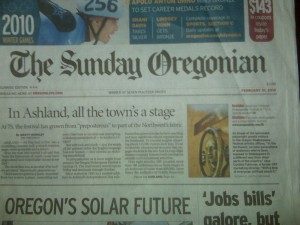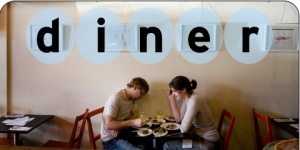You’ve probably heard the news already. On Wednesday The Oregonian laid off 37 workers, 27 in the newsroom. The cuts have long been expected. Like the rest of the daily newspaper industry, the (not so) Big (anymore) O is trapped in a nightmare downward spiral triggered by landmark technological shifts, declining readership and, OK, its own reluctance to change with the times.
 I’ve waited to write this because even now I don’t know all of the names of the people who’ve been laid off. Lips have been tight, although The Mercury’s Matt Davis has ferreted out most of the hit list here. Predictably, a lot of online smart-alecks have been snickering about this. Don’t know what to tell them except they’re insanely stupid, and callous to the extreme. These are good, talented people, most of them extraordinarily dedicated to the public good, who are now out of work.
I’ve waited to write this because even now I don’t know all of the names of the people who’ve been laid off. Lips have been tight, although The Mercury’s Matt Davis has ferreted out most of the hit list here. Predictably, a lot of online smart-alecks have been snickering about this. Don’t know what to tell them except they’re insanely stupid, and callous to the extreme. These are good, talented people, most of them extraordinarily dedicated to the public good, who are now out of work.
The possibly mortal weakening of the mainstream American press is nothing but bad news for our fragile democracy (or republic). Without the newspapers’ checks and proddings, who will speak authoritatively to power? In October of 2008 I wrote about the problems facing the news industry, and although that post offers no solid solutions (I’m no wizard), I think it lays out the difficulties pretty well.
Up until now, The Oregonian has managed the illness of its industry with remarkable grace. Maybe it hasn’t come up with answers (and maybe I’ve been frustrated by what’s sometimes seemed like a paralysis of will), but it has treated its people well, offering several generous buyout packages to its workers instead of just dumping them by the wayside, as so many other papers have. I took a buyout two years ago. My wife took one last May.
Pretty much everyone who was going to leave voluntarily has left. Now, the O has no real choice but to make the tough cuts by layoff. They’ve begun, and there could be more. I don’t pretend to understand how the decisions were made on who went and who stayed. Faced with the extraordinary difficulties of having to make these decisions about people’s lives and livelihoods, my own list would have been different in several particulars. But there’s no good way to do this thing.
This is only the start of what promises to be a massive upheaval, and my hope is that those who are left, after shaking off the shock, will reinvent the newspaper to make it more appealing, more topical, and more pertinent to people’s lives. Right now it’s a football interior lineman’s uniform hanging on what’s become a jockey’s body. Time to recognize the advantages of being a jockey and get on with the race.
 The reinvention could be — should be — exciting. Let’s all hope. And I hope that arts and cultural writing will be a vigorous part of the new Oregonian that emerges from all of this, because culture is a crucial aspect of how a city thinks of itself. In the broader sense, a city is a culture.
The reinvention could be — should be — exciting. Let’s all hope. And I hope that arts and cultural writing will be a vigorous part of the new Oregonian that emerges from all of this, because culture is a crucial aspect of how a city thinks of itself. In the broader sense, a city is a culture.
In the meantime, many of those out of work today are people I’ve spent years, even decades, working with. Some of them are friends. Some of them are in shock. All of them wonder what they’re going to do. What I want to do now is to honor a few of them, the ones I’ve worked with a little more closely than the others, the ones I’m especially thinking of:
Karen Brooks. Karen is the reason you see that Diner photo above. For a quarter-century, beginning at Willamette Week before she joined the O, Karen was the leading voice of food writing and restaurant criticism in Portland. Her style could be bubbly, over the top, unrestrained in its enthusiasm, but nobody could make the tough calls or spot the trends like Karen could. She made people sit up and notice the world of food, and like other pioneers such as her friend Matt Kramer she’s been doing it since long before Portland became a foodie town. Love her or hate her, people responded to Karen’s food writing. She stirred things up. She was also for many years the paper’s arts editor, and I worked with her both as a writer and an editor. Few people understand how much she put on the line and how hard she fought the internal political battles to protect and expand the paper’s cultural turf. That passion is a rare commodity, and attention must be paid. In the relatively straitlaced culture of the newspaper world Karen was an exotic bird, and she didn’t quite fit. Over the years that hurt her and helped the paper. Good luck, Karen. Now’s your chance to write that next cookbook.
Kevin Murphy. A steady presence, a Vietnam vet, an Irish American who was extraordinarily well-read and intensely curious about culture in many forms, from theater to dance and beyond. He put in stints in the old Northwest magazine and as an assistant arts editor, and was excellent to have on the features copy desk because he took an active interest in cultural matters and knew some of the questions to ask that others sometimes didn’t. A cultured man, the kind that every newspaper needs.
Shawn Vitt. For the past several years Shawn’s been editor of A&E, the paper’s Friday arts and entertainment guide. It’s a beast of many pieces that must be controlled. When I left the paper and began freelancing, he was always generous and welcoming. Even when I wrote too long, he’d try to find a way to make it fit. Sorry, Shawn, and thanks.
Cynthia Davis. A designer with a delicate approach, Cynthia worked on the templates for a lot of sections. She thought things through, trying to understand the essence of a story so she could figure out the best way to make it work visually. And she was a quiet, effective administrator, working well with people from other sections and handling the difficult duties of organizing a department of individualists. In many ways, a walking, talking definition of professionalism.
Fred Joe. Freddy’s a renegade, in a good way. A guy who goes after life hard (think motorcycle crashes) but also has the subtle touch that so many good news photographers have: He can relax his subjects on a photo shoot, “disappear” so they hardly notice he’s there, and make things vastly easier for the writer he’s working with. And he knows a good shot when he sees one. Always a pleasure to work with, always adding something mere writers didn’t think of.
Becki Lincks. Becki understands computers. And she understands people who don’t understand computers. And with patience, wit and a great sense of humor she helps luddites overcome their fears and get with the program. Many and many a time she intervened between me and my evil machine, and left me laughing over the encounter — an extraordinary skill. How the newsroom will survive without her, I’m sure I don’t know.
Alan Borrud. Always in the background, always unflappably helpful, always in good humor and interesting to talk with. Alan, a good photographer himself, was a photo lab guy, and good at it. If I needed something in the photo department, which is a semi-autonomous country with its own border patrols, Alan was the cheerful, helpful diplomat who’d help me cut through the red tape. Thanks, man.
Margie Boule. From being a television personality and a musical-comedy star, Margie made the difficult transition to being a newspaper columnist, specializing in telling small stories that sometimes had very large impacts. Her style divided readers and journalists alike: some followed her closely and trusted her implicitly, some dismissed her as a sob sister. But if she cried, she cried from her heart. And to many readers she was the face of The Oregonian, its ambassador to the community, the person who brought color to the black and white print. You don’t, or shouldn’t, sacrifice that lightly.
Joe Brugger. A copy editor for many, many years; a smart quiet guy with a wry outlook, one of the steady hands who didn’t get his name in the paper but helped keep the boat afloat. People with bylines desperately need the Joe Bruggers of the business.
Rebecca Lacy. Also a copy editor, quiet but intense, with a terrier’s focus when she smelled a rat in a piece of copy. If you couldn’t explain it so she could understand, you were in trouble.
Thanks for the memories, all of you. Go with grace. Hold your heads high. And remember, life can be good after the storm.